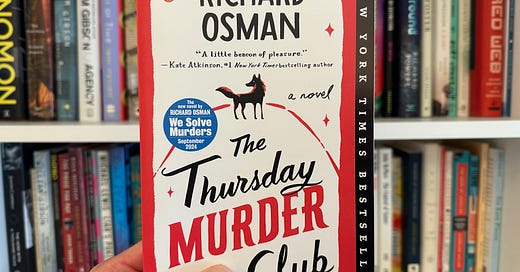The Thursday Murder Club
Thanks for the hearty response to my new little bookstore!
I sold out of Foundry and Neon Fever Dream and have already ordered more from the printer. Oh, and by popular demand, I added a Complete Collection package that includes signed copies of all eleven of my novels.
I can’t help but smile when I drop off signed copies at the mailbox around the corner. Literature is an intimate art form. You bring someone else’s words to life in your mind and heart. I prefer audiobooks narrated by the author because it furthers that feeling of direct connection, and I hope that this little experiment in direct author-to-reader commerce unlocks something similar.
And now, a book I love that you might too:
The Thursday Murder Club by Richard Osman is a delightful whodunnit set at a retirement home in the English countryside. Great characters. Fun twists. An endearing sense of humor. Nothing fancy or experimental, just a pleasure to read (and what more can you ask from a book, really?). If, like me, you enjoy mysteries, you’ll be in good hands with Osman.
Things worth sharing:
Wise words from Kevin Kelly’s annual letter: “Despite our political situation, I am more optimistic than ever before. That's because I intentionally choose to be more optimistic each year. Optimism is a choice, not a personality trait.
I am aiming to be as optimistic as I possibly can because a big dose of optimism is required to make better things real. We have to imagine a desirable future first, in order to make it happen. Complex good things won't happen inadvertently. Sure, our problems are bigger than ever before, but our ability to solve problems grows even faster. We can accomplish difficult things when we believe they are possible. Therefore our future is shaped by optimists, and I want to be one of those.”
Current advances in AI make a lot of science fiction feel obsolete, but Ian M. Banks’s Culture novels and
’s Quantum Thief trilogy hold up remarkably well.What science can perceive shapes the way it describes the world—from Philip Ball’s How Life Works: “The popular view that science is the process of studying what the world is like needs to be given an important qualification: science tends to be the study of what we can study. Its focus is biased toward those aspects of the world for which we have experimental and conceptual tools. The most populous organisms on the planet-single-celled bacteria and archaea-were not just unstudied but unknown until, in the late seventeenth century, microscopes were developed with sufficient resolution to see them. Viruses, being even smaller, weren't discovered for a further two hundred years. So for most of history, zoologists were, despite their zeal and diligence, ignorant of most of the biosphere. It is no different today: it's not just that we are limited by our tools, but that this limitation skews our perception of how the world, and how life, works.”
The world needs more unbridled curiosity, and
’s Orthagonal Bet podcast delivers. Every episode goes deep on a fringe niche, searching for surprising clues about what will happen next in technology and culture. One reason I like the podcast is because, for me, writing novels begins with curiosity, so it was fun to go on the show to discuss how learning about the insane complexity of semiconductor supply-chains inspired me to write a spy thriller about them.Last month I dropped into a book club who had just read Foundry and the discussion was a ton of fun, so if your book club is reading one of my novels, hit me up and I’ll call in for a quick Q&A.
Thanks for reading. We all find our next favorite book because someone we trust recommends it. So when you fall in love with a story, tell your friends. Culture is a collective project in which we all have a stake and a voice.
Best, Eliot
Eliot Peper is the author of Foundry, Reap3r, Veil, Breach, Borderless, Bandwidth, Neon Fever Dream, Cumulus, Exit Strategy, Power Play, and Version 1.0. He also works on special projects.
“A sharply rendered, wildly entertaining thriller speaking to the dangerous realities of our present.”
-East Bay Express on Borderless




